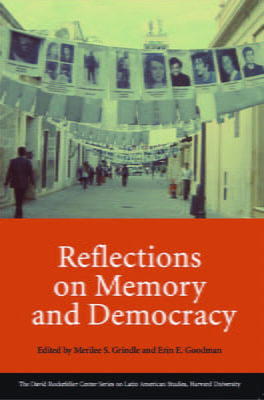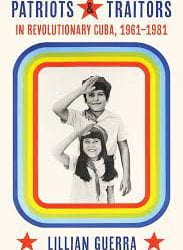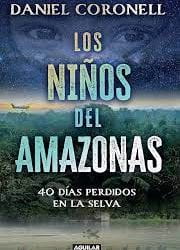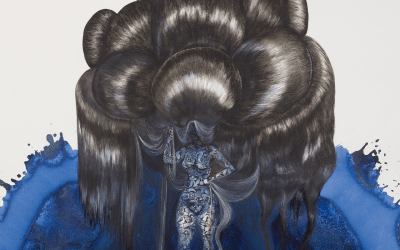A Review of Reflections on Memory and Democracy
The Politics of Memory and The Memory of Politics
by Andreas Huyssen

Reflections on Memory and Democracy Edited by Merilee S. Grindle and Erin E. Goodman David Rockefeller Center Series on Latin American Studies, Harvard University Press, 2016, 260 pages
Memory is tricky business. So is democracy. Both are invariably challenged and contested from within and from without. The struggle against the manipulation of memory for purposes of forgetting and erasure, hegemony and domination, has to be waged time and again, just as the abuses of democracy need to be confronted to guarantee its future. A strong civil society and citizens’ participation not just in elections, but in associations and public life, will strengthen both memory and democracy. The case of Latin America provides a panoply of examples of how this linkage of memory and democracy has played out in the past few decades, in some cases with more success than in others.
Indeed, there seems to be a consensus that historical memory of traumatic violence perpetrated by state terror and military dictatorships is a sine qua non for the often difficult transitions to democracy. A host of questions and problems is embedded in this consensus: transitional justice as amnesty or prosecution of perpetrators; the creation of democratic institutions and a functioning public sphere; reforms of the security apparatus, of the judiciary, of education; the role of Truth and Reconciliation commissions; creating public spaces for testimony humanizing the past; restitution in its symbolic and its real material dimensions; reconciliation and forgiveness as desirable or as a placebo covering up festering wounds; the role of public memorials and museums as well as the contributions of the arts in a society’s coming to terms with violent past. And then there is the question of memory politics in relation to Human Rights as universal or as a tool of political hegemony. I do believe that for historical memory to take hold it must be robustly linked to a developing and increasingly transnational Human Rights regime. But the exclusive focus on Human Rights will be as ineffectual as the dwelling on the horrors of the past unless it is firmly linked to social histories of oppression and inequities of wealth and privilege that far transcend the time frame of recent dictatorships and state terror, both deeper into the past and right into the present. All these issues have generated public debates across the world and filled libraries with studies upon studies of specific histories in local contexts, their transnational connectedness and affinities, their universal meaning within a globalizing culture in which violence, memory and rights have emerged as touchstones for an insecure and menacing present.
The volume here under discussion emerged out of a conference held at Harvard’s David Rockefeller Center for Latin American Studies in November 2013, shortly after the 40th anniversary of that other 9/11—the military coup in Chile of 1973. For me as an outsider of Latin American Studies, but interested observer of memory politics in Latin America, this collection of essays by journalists, writers and poets; literary critics, political scientists and historians; philosophers, economists and linguists transcends disciplinary boundaries in a felicitous way. It also offers a challenge to comparative studies, in that apart from its binding focus on Chile it includes essays on Guatemala, Peru, Brazil, Haiti, Mexico and Colombia. What emerges is a multidirectional view of memory politics across the continent that allows the reader to draw inferences between the different national cases discussed and to recognize fundamental differences between, say, Chile and Brazil, Argentina and Colombia, Guatemala and Mexico.
As the poetic prologue on the Chilean arpilleras (some of which figure prominently in Santiago’s Museo de memoria y derechos humanos) suggests, this volume of reflections is a patchwork stitched together from many histories and many memories, but united in the continuing call for justice and accountability and in the commitment to the democratizing potential of historical memory. Introduced by a framing essay by Merilee Grindle and ending with an essay by Erin Goodman summarizing conference presentations unfortunately not included (this goes especially for a presentation by John Dinges on new archives documenting disappearances in Santiago), the volume is subdivided into three parts entitled “Remembering and Democracy: Memory and Its Place in Democratic Institutions,” “The Challenges of ‘Capturing Memory’” and “Citizenship and Democratic Futures.” The first part contains two pieces dealing with disappeared and slain journalists, pointing to the repression of a free press in Guatemala (June Erlick) and in Haiti (Michele Montas) and two pieces by political actors: Sergio Bitar, a member of Allende’s government turned social democrat, who describes the slow pace of democratic change in Chile and argues that reconciliation still has a long way to go; and Salomón Lerner, chair of Peru’s Truth and Reconciliation Commission, who reminds us forcefully of the ingrained racism at the root of much of Peru’s violence perpetrated on the civilian population, a problem Peru shares with other Latin American countries.
Part II focuses on three literary pieces. Marguerite Feitlowitz on three Argentine novels featuring children of the disappeared as detectives of their parents’ fate, which can never be fully revealed by memory; Susana Draper on a Mexican woman’s prison memoir from 1968 which focuses on class and gender stereotypes on the Mexican left; Ava Berinstein’s essay on the struggles of community radio stations in Guatemala and Belize in preserving Mayan oral culture, an essay that links up compellingly with Lerner’s political reflections on indigenous populations in Peru.
The third section begins with two essays on the deficiencies of memory politics in Brazil and in Chile. Frances Hagopian analyzes why and how Brazil is a latecomer to the Latin American memory debates. In contrast to Argentina, Brazil had accepted the idea that in order to secure democracy after the military dictatorship, war crimes could go unpunished. Amnesia was the result. Only under the Lula government was there even an uptick of memory concerns, probably more as a result of international pressure than as a reflection of a deep-seated social need to come to terms with the history of Brazil’s military dictatorship, the longest lasting in Latin America. Turning to Chile, Peter Winn describes how Allende and his era continue to shadow memory politics there. He contends that the avoidance of that period is the great repressed gap of the post-Pinochet politics of the concertación. The deficiencies of memory politics in Chile—and here his piece resonates strongly with Bitar’s though they may represent different political positions—can only be overcome if civic memories from Allende’s experiment in socialism can feed into contemporary struggles for memory, justice and equity. The concluding country-focused piece in Part III is Paolo Vignolo’s essay about the Central Cemetery of Bogotá as a site joining cultural heritage and historical memory and thus functioning as an open air museum nurtured by active citizenship for memory building. Perhaps this is a fitting conclusion in the sense that Colombia’s half-a-century-long violencia which is still going on has been the worst on the continent.
Chile, of course, remains in the center of this book. A recent visit to Santiago and its many public sites of torture and remembrance convinced me that the Museo de memoria y derechos humanos will eventually have to include more about the Allende years than the president’s last radio address to his people. As national memory is at stake, the museum may even need to address the deep history of colonization and its effects on the indigenous minority population all the way to the present. If human rights are universal, they cannot be limited to the post 9/11 regime. What to include and what to exclude is always a political struggle, but both should be subject to reconsideration and change—even and especially in a museum that lays claim to historical knowledge. Chile, of course, is the paradigmatic case for the havoc caused by the neoliberal economics of the Chicago Boys in Latin America during the Cold War. Many have argued that the main effect of the dictatorships has been to prepare the ground for neoliberal economics in Latin America. Chile’s 9/11 will always remind us of the invisible elephant in the room, not just in Chile, but in Latin and Central America as a whole: the United States and its Cold War politics followed by the Washington Consensus of neoliberal economics. But the United States is strangely absent from this volume as it is from the memorial sites in Santiago, Valparaiso and Paine I visited a few months ago.
While the volume recognizes that memories are always contested, often unreliable, and threatened by erasure, it offers a view on Latin American memory politics that could only be had in retrospective and with the passage of time. Democratic political culture (this seems to be a common assumption underlying the essays) was nurtured by a growing sense of revulsion about the military dictatorships of the past. The commitment to democracy and civil society resulted from changes in the mentality of political actors both on the right and on the left. As Frances Hagopian argues, today the everyday terror of the past is no longer “a crushing weight on the brains of the living” (Marx) as it was in the years right after the dictatorships in, say, Argentina in the 1980s or Chile in the 1990s. Muted by the passing of time, the growing up of new generations, and refracted by the multiple struggles for justice and accountability, memory of that terror has become a major factor in shaping democratic societies across Latin America. Some will find this view too optimistic, given the continuing lack of accountability and persistent impunity in several Latin American countries. As I know from my own history having grown up in West Germany after World War II, the struggle for memory never ends; it changes its shape; it keeps having to confront revenants, new evidence, new archives; and it remains a task for future generations. Ultimately, it is and remains a political struggle for democracy. The politics of memory will go nowhere unless it is accompanied by a robust sense of a memory of politics.
Andreas Huyssen is Villard Professor of German and Comparative Literature at Columbia University. He is the author of many books, including Miniature Metropolis: Literature in an Age of Photography and Film and Present Pasts: Urban Palimpsests and the Politics of Memory (Cultural Memory in the Present).
Related Articles
A Review of Patriots and Traitors in Revolutionary Cuba, 1961-1981
I remember when I first heard Lillian Guerra speak: over fifteen years ago, at Brown University, about her third book, Visions of Power in Cuba: Revolution, Redemption and Resistance (1959-1971).
A Review of Los Niños del Amazonas: 40 Días Perdidos en la Selva
Los niños del Amazonas. 40 días perdidos en la selva is the first true book by Colombian journalist Daniel Coronell, whose long and impressive career speaks for itself: news director of manifold networks; recipient of prestigious recognitions such as Emmys, Peabodys and Simón Bolívar prizes; and arguably the most widely read columnist in Colombia, where he is as much admired as he is feared.
A Review of Channeling Knowledges: Water and Afro-Diasporic Spirits in Latinx and Caribbean Worlds
Water is a powerful tenet of Afro-diasporic religions that troubles academic disciplines and racial categories that define state, military and geographic borders.




